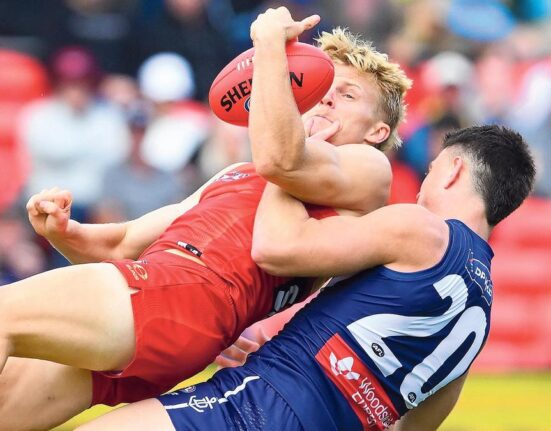Andrew Dillon, the AFL chief, recently found himself at the center of a storm of controversy following the reshuffle of the AFL executive that led to the demotion of Laura Kane and Indigenous identity Tanya Hosch. Dillon, in response to the fierce criticism and backlash, has stepped out to clarify the reasoning behind these decisions. Kane, a pivotal figure in the AFL landscape, saw her role split, with her oversight over key football areas no longer intact. Dillon, in a candid interview with SEN radio, emphasized that the changes were not made on a personal level but were strategic decisions aimed at ensuring the AFL’s continued success in the coming years.
Dillon highlighted the importance of making decisions that benefit the organization as a whole, emphasizing that the AFL is currently in a strong position and the restructuring was a forward-thinking move. Despite the uproar surrounding Kane’s demotion, Dillon maintained that it was not driven by unconscious gender bias but rather a strategic realignment of responsibilities. He praised Kane as an exceptional talent who has shattered barriers in the industry, emphasizing her valuable contributions to the AFL.
The departure of Tanya Hosch, the first Indigenous member of the AFL executive, also stirred discussions within the AFL community. Dillon addressed concerns about Hosch’s exit, noting that the restructuring would pave the way for a more inclusive and diverse leadership landscape within the organization. The role of inclusion and social policy management held by Hosch will be integrated into the existing corporate affairs portfolio, signaling a broader approach to incorporating First Nations engagement and inclusion across all facets of the AFL.
In addition to addressing internal changes, Dillon also took the opportunity to defend the standard of umpiring in the current season. Amid mounting scrutiny and criticism, Dillon stood firm in his support of the umpiring fraternity, praising their talent and decision-making abilities. He acknowledged that achieving perfection in umpiring, much like in player performances, was a continuous process of improvement. Dillon emphasized the importance of looking at the bigger picture and not focusing solely on isolated incidents to assess umpires’ performance.
One of the contentious issues raised was the implementation of four field umpires, with some critics pointing to inconsistencies in officiating. Dillon remained optimistic about the system, highlighting its potential benefits in providing umpires with better positioning and reducing physical strain. He expressed confidence that the evolution towards utilizing four umpires would yield positive results in the long term, especially in nurturing young umpiring talent and enhancing overall officiating standards.
As the AFL navigates through these organizational shifts and challenges, Dillon’s insights shed light on the strategic vision driving these decisions. By prioritizing the long-term success and inclusivity of the AFL, Dillon aims to steer the organization towards a more robust and diverse future. Amidst criticisms and uncertainties, his unwavering commitment to excellence and progress remains a guiding force in shaping the AFL’s trajectory in the ever-evolving landscape of Australian football.









Leave feedback about this